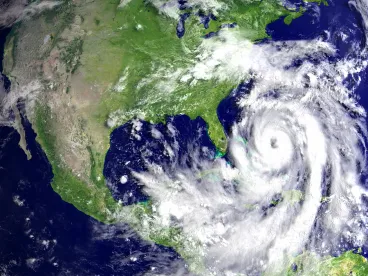In response to the impact of Hurricanes Harvey and Irma, parts of the United States have been declared as major disaster areas by the federal government. As a result, numerous states have enacted delayed filing and payment periods for individuals and businesses located in these major disaster areas. Louisiana has joined this growing list with the Department of Revenue’s release of Revenue Information Bulletin No. 17-015.
The Bulletin provides that the Department will grant filing extensions to taxpayers whose homes, principal places of business, or critical tax records are located in any of the disaster areas declared as disaster areas by the president as a result of Hurricane Harvey. The due date for qualifying tax returns has been extended to January 31, 2018 for individual income, corporate income and franchise, fiduciary, partnership, and partnership composite taxes with original or extended due dates on or after August 23, 2017, and on or before December 31, 2017. Taxpayers requesting such relief should identify their returns by writing “Hurricane Harvey” in black ink on top of the form.
Other pertinent state relief:
Alabama
- Alabama Department of Revenue Press Releases: August 29, August 31, September 12, 2017
- Alabama taxpayers residing in Texas or Florida counties designated as disaster areas by the federal government have until Jan. 31, 2018, to file tax returns due on or after Sept. 1 (Sept. 15 for Hurricane Irma victims), 2017, and before Jan. 31, 2018.
- Penalty relief will be provided during the extension period.
- Taxpayers seeking this tax relief should write “Texas Flood 2017” or “Irma Relief – 2017” in red ink on any state paper return/report which relies on this filing extension relief.
- The relief applies to individual income tax, corporate income tax, pass-through entities, sales and use tax, withholding tax, and business excise tax.
- IRP/IFTA requirements for vehicles are temporarily suspended for vehicles engaged in disaster relief efforts.
Florida
- Florida Department of Revenue, Current Topics – Hurricane Tax Relief
- The Florida Department of Revenue will follow the tax relief granted by Internal Revenue Service regarding postponement of return due dates.
- Florida corporate income tax returns, as well as Florida corporate income tax installment payments, with original due dates or extended due dates between Sept. 4, 2017 and Jan. 31, 2018 will now be due Feb. 15, 2018.
- Sales and use tax returns filed by 5:00 p.m. on Sept. 28, 2017 will be deemed timely filed.
- Taxes on fuel trucks entering the state are waived to expedite fuel delivery.
- Penalties for the sale of dyed diesel field are waived to any person who sells or uses dyed diesel fuel for highway use.
Georgia
- Georgia Department of Revenue, Press Releases: September 5, September 12, September 14, 2017
- The Department is postponing until January 31, 2018, certain deadlines for individuals who reside, and businesses whose principal place of business is located, in the disaster areas specified by the IRS.
- This extension now applies to all counties in Georgia as a result of Hurricane Irma
- The postponement also includes return filing, tax payment, and other time-sensitive acts related to Georgia tax types such as Georgia sales and use tax but does not apply to International Fuel Tax Agreement interest. This includes monthly sales tax returns originally due September 20, 2017, October 20, 2017, November 20, 2017, December 20, 2017, and January 22, 2018. It also includes quarterly sales tax returns due October 20, 2017, and January 22, 2018, as well as annual sales tax returns due January 22, 2018.
- Affected taxpayers filing paper returns should write: “2017 Texas, Hurricane Harvey” or “2017 Hurricane Irma” across the top of any forms submitted to the Department.
- IRP/IFTA requirements for vehicles engaged in disaster relief efforts are temporarily suspended.
Texas
- Texas Comptroller, Declared Natural Disasters and Emergencies Tax Help
- Taxpayers in declared disaster areas affected by Hurricane Harvey can contact the Comptroller’s office and request up to a 30-day extension to file and pay certain monthly and quarterly state taxes.
- For the 2017 franchise tax reports with valid extensions to Nov. 15, the Comptroller’s office is granting an automatic extension to Jan. 5, 2018, to businesses located in the federally declared disaster area in Texas. Businesses located in these counties do not need to request an extension for their franchise tax reports. Service providers who file franchise tax reports on behalf of other taxpayers can request a franchise tax extension if the provider is affected by Hurricane Harvey.
- The Comptroller’s office is granting businesses located in the federally declared disaster areas in Texas that are not required to file electronically, an automatic 30‐day extension to complete August monthly reports due Sept. 20 and quarterly reports due Oct. 20.
- In addition to allowing the Comptroller to extend tax-filing deadlines, Texas law exempts certain recovery-related expenses from sales tax, including:
- (i) the cost of labor to repair storm-damaged, nonresidential property, including office buildings and stores. Labor charges must be separately stated on the repair bill. Texas also does not impose sales tax on labor for residential repairs;
- (ii) services used to restore storm-damaged tangible personal property, including dry cleaning of clothing and draperies, rug and carpet cleaning, and appliance repairs regardless of whether the property is residential or nonresidential.
- All laws authorizing or requiring the collection of state or local hotel or motel occupancy taxes from the victims of Hurricane Harvey or personnel participating in relief operations are suspended beginning August 23, 2017, and ending October 23, 2017.
- Temporary waiver of the International Fuel Tax Agreement (IFTA), which will suspend requirements that trucking firms track and pay tax on the amount of fuel used in Texas when delivering needed relief supplies and fuel into the state.
As hurricane season continues to bring devastation to parts of the U.S., states will continue to extend relief to these declared disaster areas. Read more on State Tax Relief for Hurricane Victims.



 />i
/>i

